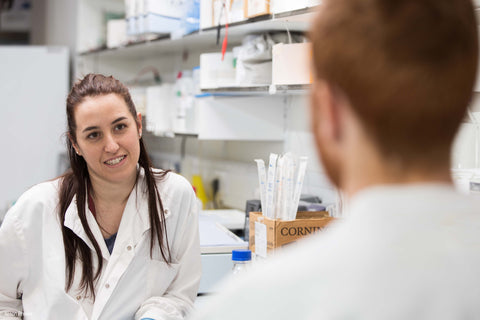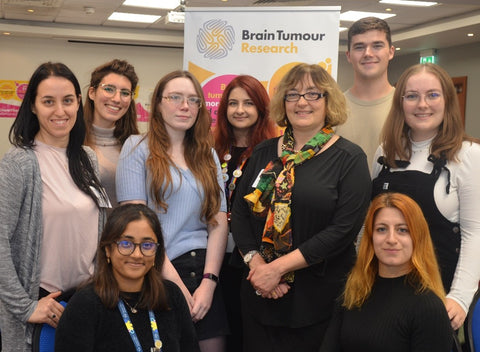Dr Sara Badodi, a Postdoctoral Researcher at the Brain Tumour Research Centre of Excellence at Queen Mary University of London, has been appointed to Junior Principal Investigator (PI) - a pivotal step in her research career.

Brain Tumour Research is dedicated to funding continuous and sustainable scientific research into brain tumours. In order to achieve this, it is vital that talented researchers are attracted to, and remain, in the brain tumour research field, therefore early career research training is a key part of the Centre of Excellence awards.
Dr Badodi joined the research team, led by Professor Silvia Marino, in 2019 following a generous donation from Peter and Jane Gardiner, who lost their son Ollie to a medulloblastoma, aged 13. She has flourished under Prof Marino’s mentorship and is now setting up her own research group within the Centre of Excellence with a focus on aggressive medulloblastoma tumours. Her promotion to Junior PI is an excellent step towards more independent researchers in the UK brain tumour sector, increasing capacity and getting us closer to a cure.
Nicola Gale, our Research Communications Officer spoke with Sara to find out more about this next step in her career.
What is a Junior PI?
A Junior PI is a scientist leading their own first research group, with responsibilities including designing new projects to answer specific questions, seeking funding to develop these projects, recruiting and training other scientists to work in their team and publishing the findings of their research. The usual path to become head of a laboratory typically involves a PhD, one or more post-doctoral research positions and then finally a PI role, often encompassing an academic lecturer position, hence requiring also some involvement in teaching.
What project will you be leading?
My work will be focused on studying the mechanisms that regulate the activity of proteins which modify the genetic code (DNA) and understanding how these events are involved in the development and maintenance of paediatric brain tumours to identify ways to treat them in a more effective and less toxic way.
How will your project benefit patients and get us closer to a cure?
The aim of my research is to exploit what we have discovered about tumour behaviour to support the development of molecularly tailored therapies. Learning more about how subgroups of paediatric brain tumours originate, proliferate and resist to therapies will lead to novel treatments, which are more effective and less toxic. Our ultimate goal is to identify events occurring only in the tumour cells – and not in the normal tissue – to develop therapies aiming at killing the tumour while preserving the healthy cells in the developing brain of children.
What challenges do post-doctoral researchers face as they progress through their career, especially in brain tumour research?
I think that the main challenge for a post-doctoral fellow is the uncertainty that is linked with an academic career, and the fact that you have to come to terms with this uncertainty while you aim at being as successful as possible in your research in order to go on and shape your scientific independence. This step requires probably the strongest motivation of any time in our career.
In my personal experience as a researcher in brain tumour field, a key part of my motivation comes from supporters who visit us during the lab tours; they help me realise the potential impact of my research and keep me focused on the final purpose of my work.
What did the funding support from Brain Tumour Research mean for you in your earlier career, and now in your Junior PI role?
First of all, the support from Brain Tumour Research and from Ollie’s family allowed me to continue a research career in the brain tumour field, one of the most challenging scientific areas of research. Thanks to this funding I was able to publish groundbreaking results in medulloblastoma, the most common aggressive paediatric brain tumour, and collect compelling data that allowed me to design the project that I will now develop as a Junior PI. Hence, the continued support from Brain Tumour Research will be instrumental for the progress of my career in the brain tumour field and will help me achieve my goals and make a real difference for the patients affected by these tumours.

Researchers at the Brain Tumour Research Centre of Excellence Queen Mary University of London.
Related reading:

